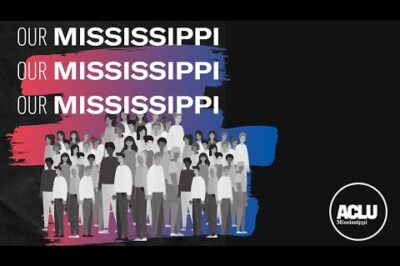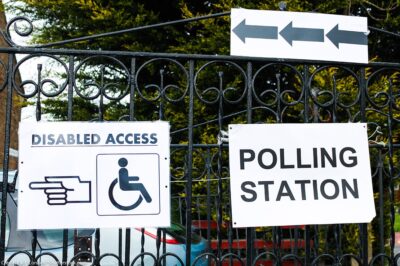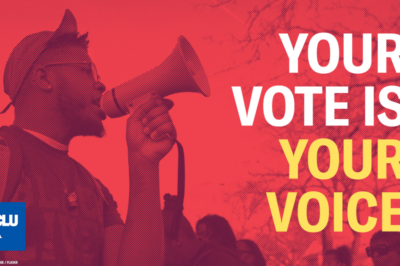ACLU Records Request Reveals More Than 13,000 Florida Citizens Are Eligible to Vote But May Not Know It
Thousands of rights restoration notifications gathering dust in Capitol
FOR IMMEDIATE RELEASE
CONTACT: (212) 549-2666; media@aclu.org
The American Civil Liberties Union (ACLU) of Florida announced today that a recently returned public records request filed by the organization with the Florida Parole Commission has uncovered 17,604 Restoration of Civil Rights (RCR) certificates that were returned to the Parole Commission as “undeliverable,” meaning thousands of Florida citizens have the right to vote, but have not been notified by the state.
The certificates are proof of restoration of civil and voting rights for Florida citizens who have completed the terms of their sentences for a felony conviction, and that they are eligible to register and vote in the November Election.
Further review of the state’s voter rolls shows that 77% of these citizens (13,517 people) have not yet registered to vote and may not know that their voting rights have been restored and may believe that they are not eligible to vote.
“The contrast between the baseless claims that Governor Scott has made about voter fraud and the lengths to which he has gone to make voting more difficult, and the inattention to the thousands of voting rights restoration certifications gathering dust in the capitol could not be sharper,” said Howard Simon, ACLU of Florida Executive Director.
“The spirit of American democracy lives first and foremost in our precious right to vote and choose our leaders. But here in Florida, Governor Scott has done nearly everything in his power to make voting more difficult, from blocking countless citizens from voting, to neglecting the rights of those who can.”
The RCR certificates returned as undeliverable may have already resulted in keeping as many 13,517 citizens from voting in the August 14 primary. Unless they are notified soon that their voting rights have been restored, these same citizens will also lose their right to vote in the presidential election this November, which requires that they first to register to vote by the October 9 deadline.
“With all the resources and tax payer money Governor Scott is dedicating to make it more difficult to vote in November, it is not likely that he will lift a finger to dust off the returned certificates to ensure they reach the mailboxes of legal Florida voters,” Simon added.
The ACLU is encouraging Florida citizens who applied to have their rights restored but who have not received a response from the state to either call the Florida Parole Commission at 1-800-435-8286; visit the Florida Rights Restoration Coalition (FRRC) website at www.restorerights.org, and click “How to Restore Rights” to learn how to check your status, print your RCR certificate, and use it to register to vote; or contact your local county Supervisor of Elections office for assistance in checking your status and determining whether you are eligible to vote.
In order to vote in the November Election, eligible citizens must register before the October 9, 2012 registration deadline.
“The significance of 17,604 returned RCR Certificates should be seen in conjunction with the number of former felons who were able to regain their civil and voting rights in 2011 following the Scott Administration’s new Rules of Executive Clemency — a mere 78,” noted the ACLU’s Simon. Approximately 4,000 felons are released from custody or terminated from supervision upon completion of sentence every month, resulting in approximately 50,000 per year.
A Note on the Status of Felon Disfranchisement in Florida
In March 2011, shortly after Governor Scott was sworn into office, he and Attorney General Pam Bondi led the Cabinet in reversing Rules of Executive Clemency that were adopted during the Crist Administration, and adding new restrictions on rights restoration. The Rules adopted by the Board of Executive Clemency, comprised of the members of Gov. Scott’s cabinet, made it much more difficult for former felons to regain their civil and voting rights. The rules change required former felons to wait at least five or seven years after they completed their sentences before they were eligible to apply for the Restoration of Civil Rights after they completed their sentences.
A staggering 1,059,301 Florida citizens are disenfranchised (according to the latest study by Christopher Uggen, Sarah Shannon of the University of Minnesota and Jeff Manza of New York University). This is 3 times the number of the next nearest state – Texas. Of the 5.8 million disfranchised citizens in the Unites States, one-quarter are Floridians.
Florida’s disfranchisement rate is the highest in the country – 10.42% of the state’s voting age population are disfranchised. And a shocking 23% of Florida’s African-American population is disfranchised.
While 37 states automatically restore rights after completion of sentence, or some stage of supervision, Florida is one of only four states (Virginia, Kentucky and Iowa being the others) that impose lifetime disenfranchisement upon conviction of a felony.
Stay Informed
Every month, you'll receive regular roundups of the most important civil rights and civil liberties developments. Remember: a well-informed citizenry is the best defense against tyranny.




